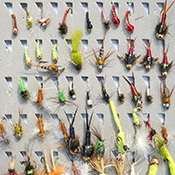Meet a Faculty Member: Don Haynes
Category: Noteworthy

Haynes demonstrates how to cast a fly fishing rod while standing in the Gunpowder River. He estimates he and his wife, Norma, spend 60-70 days fishing each year. photography: Christopher Myers
When Don Haynes, associate professor in the School of Public and International Affairs, isn’t at UB, odds are you’ll find him knee-deep in the Gunpowder River or in the Jones Falls with a fly-fishing rod in hand.
Haynes grew up fishing in a “good-sized creek” behind his Southern Virginia home. “Fishing was kind of normal,” he recalls, explaining that he started fishing as most other people do—with regular spin rods, the kind used to fling a heavy lure into the water. In his late teens, Haynes bought a rod for fly fishing, a more manual method that requires a special casting technique and uses a comparatively weightless lure, but he had difficulty catching on.
“There’s a pretty steep learning curve on how to do it, and there was nobody around to teach me,” Haynes explains.
Although he fished from time to time over the next few decades, it wasn’t until he reached his 40s that he gave fly fishing another try.
“About six years ago, when the kids were gone and we had an empty nest, we were looking for something to do,” Haynes says, explaining that his wife, Norma, grew up fishing in the ocean. After the pair took a half-day fly-fishing lesson, they were hooked.
Now, the couple spends many weekends and late afternoons fishing, and they’ve also become involved in conservation efforts. Haynes holds elected positions at the local and state levels of Trout Unlimited, a volunteer organization dedicated to protecting and restoring North America’s fisheries. He and his wife also participate in City Catch, an annual event in which children learn to fish in Baltimore waterways, and Casting for Recovery, which hosts retreats for breast cancer survivors.
When asked why he loves his hobby, Haynes doesn’t have to fish for reasons. “There’s an old saying: ‘Trout don’t live in ugly places,’” he begins with a chuckle. But then things turn serious: He talks about the sport’s therapeutic nature and how it intersects with other pursuits, including entomology (“You’re imitating bugs, so you need to know what bugs do”), geomorphology (“You’re trying to find out where in the water column the fish will be”) and meteorology (“The weather is such a factor”). He’s also interested in the history and literature surrounding the sport; he’s read works on fly fishing that date back to the 16th century, and he also references contemporary reads, including Norman Maclean’s popular novel-turned-movie A River Runs Through It.
“It’s not just an activity,” he says. “You’re always picking up these bits and pieces [of knowledge about the sport]. It’s something you have to be into—and not only literally into the fishing, but [into] all aspects of it.”





